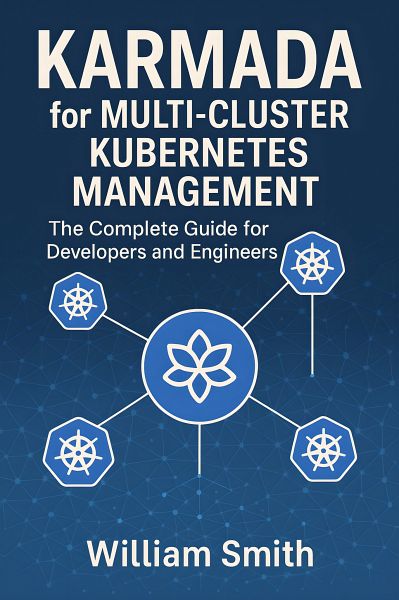
Karmada for Multi-Cluster Kubernetes Management (eBook, ePUB)
The Complete Guide for Developers and Engineers

PAYBACK Punkte
0 °P sammeln!
"Karmada for Multi-Cluster Kubernetes Management" Karmada for Multi-Cluster Kubernetes Management is an in-depth, authoritative guide for technology leaders, platform engineers, and architects navigating the complexities of multi-cluster Kubernetes deployments. The book begins with a comprehensive exploration of the motivations behind multi-cluster adoption-including business drivers, compliance requirements, and the practical realities of hybrid, multi-cloud, and edge strategies. Readers are equipped with essential context, from foundational Kubernetes concepts to the historical evolution of ...
"Karmada for Multi-Cluster Kubernetes Management" Karmada for Multi-Cluster Kubernetes Management is an in-depth, authoritative guide for technology leaders, platform engineers, and architects navigating the complexities of multi-cluster Kubernetes deployments. The book begins with a comprehensive exploration of the motivations behind multi-cluster adoption-including business drivers, compliance requirements, and the practical realities of hybrid, multi-cloud, and edge strategies. Readers are equipped with essential context, from foundational Kubernetes concepts to the historical evolution of multi-cluster management, positioning Karmada as a next-generation orchestrator purpose-built for cross-cluster control, scalability, and resilience. Delving into Karmada's architecture, the book systematically unpacks its control plane, scheduling engines, API interfaces, and core resource management constructs. It provides hands-on guidance for every stage of the operational lifecycle: from installation and onboarding of member clusters, to validation, troubleshooting, upgrading, and disaster recovery. Advanced chapters cover resource propagation, scheduling policies, network topologies, service discovery, and observability, addressing challenges such as secure inter-cluster communication, multi-tenancy, cost control, and regulatory compliance within distributed environments. With meticulous attention to real-world needs, this volume discusses day-2 operations, performance optimization, and security hardening-including progressive strategies for authentication, secrets management, and supply chain protection. Case studies, operational postmortems, and community best practices illustrate the tangible benefits and deployment lessons from enterprise adopters. Complete with forward-looking perspectives on industry standards, API automation, CI/CD integration, and the evolving CNCF ecosystem, this book is both a practical manual and an invaluable strategic resource for Kubernetes practitioners aiming to master multi-cluster orchestration with Karmada.
Dieser Download kann aus rechtlichen Gründen nur mit Rechnungsadresse in A, B, BG, CY, CZ, D, DK, EW, E, FIN, F, GR, H, IRL, I, LT, L, LR, M, NL, PL, P, R, S, SLO, SK ausgeliefert werden.













